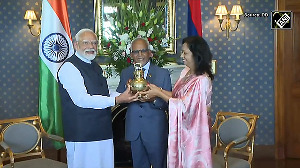The Indian owner of an international electronics company on Thursday pleaded guilty to conspiracy to illegally export restricted components from the United States to Indian government entities involved in space programme and production of missiles and fighter jets.
Parthasarathy Sudarsan, 47, CEO of Cirrus Electronics, entered his guilty plea in US District Court for the District of Columbia to the felony charge of conspiracy to violate various laws, including Arms Export Control Act and the International Traffic in Arms Regulations.
A resident of the US state of South Carolina, Sudarshan supplied microprocessors and other electronic components to Indian agencies including the Vikram Sarabhai Space Centre and Bharat Dynamics Ltd, which is involved in development and production of ballistic missiles, between 2002 and 2006, the US Department of Justice claimed.
"Both VSSC and BDL are on the Department of Commerce's Entity List and exports of US-origin commodities to these entities are restricted and require prior authorisation in the form of a license from the Department of Commerce," the Department said.
Sentencing is scheduled for June 16. Sudarshan faces a maximum punishment of five years in prison, a $250,000 fine and three years of supervised release.
Cirrus has offices in Simpsonville, South Carolina, Singapore and Bangalore, India.
The court documents accuse Sudarshan and others at Cirrus of providing the US companies with fraudulent certificates that claimed that the end-users of these electrical components were non-restricted entities in India, when, in fact, the items were for VSSC.
"There were no export licenses for any of the shipments to VSSC and BDL. To further conceal from the US government that goods were going to entities in India on the Department of Commerce Entity List, Sudarshan would route the products through its Singapore office and then send the packages on to India," the department claimed.
In addition to supplying VSSC and BDL with components, it alleged that Sudarshan acquired microprocessors for the Tejas, a fighter jet under development in India.
The microprocessors were necessary for the navigation and weapons systems of the Tejas, it claimed.
"Because the microprocessors are on the US Munitions List, the State Department must license any export of the products. On two occasions in 2004 and 2006, Cirrus caused the shipment of a total of 500 microprocessors to the Aeronautical Development Establishment. There were no licenses for these shipments," the Justice Department said.
US Attorney Jeffery Taylor said Sudarsan participated in "clandestine network that circumvented our export laws and put sophisticated technology in the hands of foreign companies that were listed as end-users of concern for proliferation reasons".
"With this prosecution, the defendant will no longer be able to make a profit at the expense of our national security. This case also demonstrates the priority our government has placed on combating such networks," he added.







 © 2025
© 2025